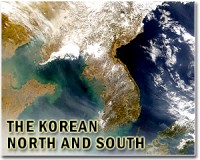 |
London (AFP) Nov 23, 2010 North Korea's artillery attack on South Korea is likely linked to the eventual power transfer from leader Kim Jong-Il to his youngest son, a leading analyst said Tuesday. Mark Fitzpatrick, a fellow of the International Institute for Strategic Studies (IISS) in London and formerly a senior official at the US State Department, said however that it was unlikely to lead to full-scale conflict. "It's hard not to draw the conclusion that this, like the Cheonan sinking, was related to the succession," Fitzpatrick told AFP, referring to a South Korean warship in March that Seoul said was hit by a North Korean torpedo. Both incidents were ways to give North Korean heir apparent Kim Jong-Un "some accomplishments," he said. "He has had little time to do anything at age 27, but given a general's title the North would like to gird him with some military victories and this is one that will surely be ascribed to his military leadership," he added. North Korea was, however, also trying to force South Korea back into talks on the disputed Yellow Sea border, said Fitzpatrick, the senior fellow for non-proliferation at IISS and ex-former US deputy assistant secretary of state. "One reason North Korea took this provocative step is to get the South's attention, to say: 'Look, unless you're willing to negotiate on this line of demarcation, you're going to draw military consequences,'" he said. World powers condemned Tuesday's attack on Yeonpyeong island near the Yellow Sea border, which killed two marines, but nuclear-armed North Korea accused South Korea of firing first. Fitzpatrick said the clash was a "serious escalation" in tensions, especially after North Korea's disclosure at the weekend of an apparently operational uranium enrichment plant. But he added: "I don't think it will turn into a full-scale war, South Korea will be very careful not to escalate its response." Seoul would, though, seek diplomatic responses -- even though they may have no lasting effect on changing Pyongyang's thinking. They would include "responding diplomatically through the United Nations, working with the United States to get China to tighten up implementation of previous Security Council measures," he said.
Share This Article With Planet Earth
Related Links Learn about nuclear weapons doctrine and defense at SpaceWar.com Learn about missile defense at SpaceWar.com All about missiles at SpaceWar.com Learn about the Superpowers of the 21st Century at SpaceWar.com
 US: too early for military action after North Korea assault
US: too early for military action after North Korea assaultWashington (AFP) Nov 23, 2010 The United States said Tuesday it was too early to consider a military response to North Korea's attack on a South Korean island, while President Barack Obama was "outraged" by the deadly assault. Obama was awakened before dawn with news of one of the worst border crises in 60 years and the White House immediately demanded Pyongyang respect an Armistice agreement that ended the 1950-53 Korea ... read more |
|
| The content herein, unless otherwise known to be public domain, are Copyright 1995-2010 - SpaceDaily. AFP and UPI Wire Stories are copyright Agence France-Presse and United Press International. ESA Portal Reports are copyright European Space Agency. All NASA sourced material is public domain. Additional copyrights may apply in whole or part to other bona fide parties. Advertising does not imply endorsement,agreement or approval of any opinions, statements or information provided by SpaceDaily on any Web page published or hosted by SpaceDaily. Privacy Statement |